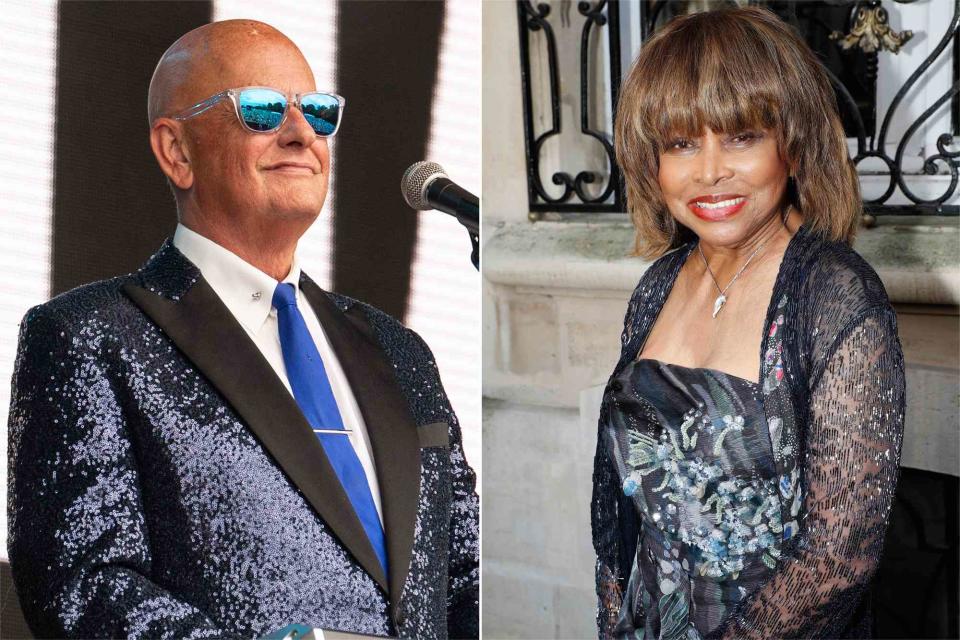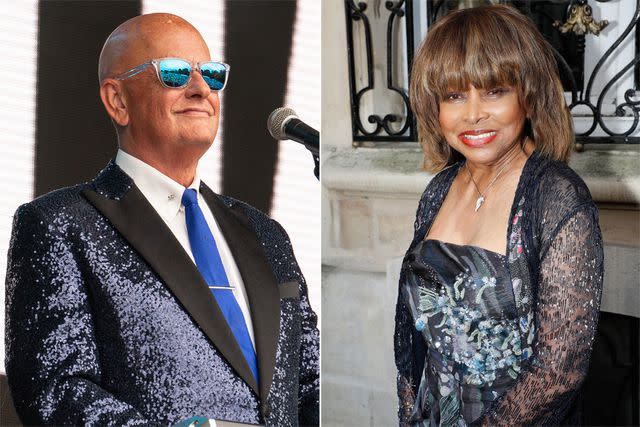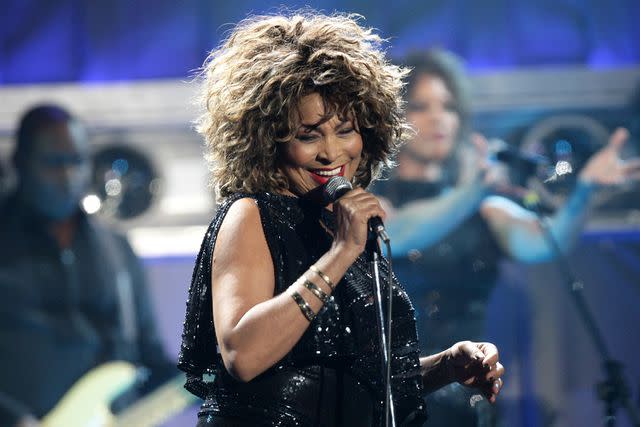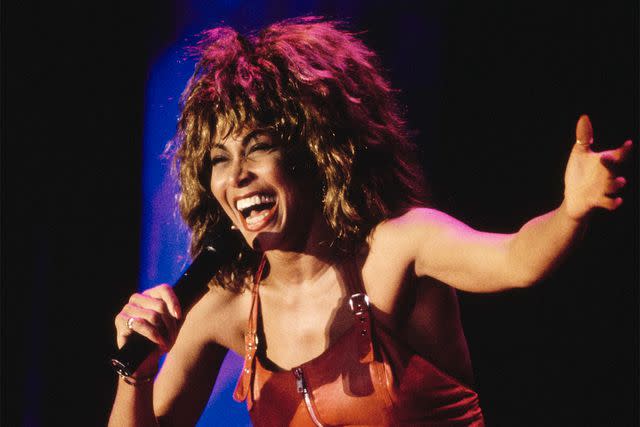Martyn Ware Remembers 'Funny and Charming' Pal Tina Turner: 'Always Had a Twinkle in Her Eye' (Exclusive)
- Oops!Something went wrong.Please try again later.
- Oops!Something went wrong.Please try again later.
"She had utmost confidence in her ability," the Heaven 17 member tells PEOPLE. "All she required was the opportunity and she was going to run with that ball"

Lorne Thomson/Redferns; Bertrand Rindoff Petroff/Getty
Martyn Ware; Tina TurnerIt was the song that brought Tina Turner back — and fired up her rebirth as a pop queen.
Turner's 1983 cover of Al Green's "Let's Stay Together" was the beginning of a new kind of career for her, bringing her worldwide superstar pop fame that transcended her previous niche of bluesy and harder rock persona.
The song was a collaboration with co-producer Martyn Ware, of Brit synth-pop group Heaven 17.
"I said to her, 'We need to fix your legacy as one of the great soul singers of all time, but in a contemporary context.' We used our electronic pop production skills to put her in a different frame. And it worked," Ware, 67, tells PEOPLE as he looks back on his time with Turner, who died Wednesday at age 83. "It is the almost perfect combination of modernity and traditional soul values. That's what we were aiming for."
He adds, "It was the biggest-selling 12-inch single in American history at that point."

Lorne Thomson/Redferns; Bertrand Rindoff Petroff/Getty
Martyn Ware; Tina TurnerBut it was bigger in the U.K. and Europe — and came a year before Turner's massive worldwide sensation, the album Private Dancer. "It laid a foundation and made everybody sit up and say, 'Hold on a second. This might not be the last candle burning brightly before it goes out, this may have legs' — if you excuse the pun," Ware recalls.
Their working relationship began when he and fellow producer Greg Walsh were making a side project — a compilation album featuring various singers — in 1982. Turner sang "Ball of Confusion."
She didn't have a record contract at the time but was making a good living touring Britain and Europe doing "Proud Mary" and the older material. And her manager Roger Davies wanted to steer in a new direction, so the partnership was fortuitous.
Turner "was the opposite of hot when we started working with her," Ware admits. "It was regarded as a novelty project when we started with her — she's had her heyday and coming back and doing something that was quite modern."
Related: Tina Turner 'Believed in Herself Completely When Few Others Did,' Remembers Longtime Manager
And that had only happened because their initial choice, James Brown, had suddenly turned them down and someone suggested Turner. When she came into the studio in London, Ware recalls Turner asked, "Where’s the band?" He adds, "There was no band — just us and synthesizers which, back then, was quite unusual."
He remembers her adapting quickly. "She was very professional, very friendly and very humble — in only the way someone who's supremely talented can be. She had utmost confidence in her ability and her ability to perform," Ware tells PEOPLE. "All she required was the opportunity and she was going to run with that ball."
After that release, Turner and Davies asked if Heaven 17 wanted to write a couple of songs for the upcoming LP Private Dancer, but they didn't have time. Instead, the group suggested she record a couple of cover versions. "The top of my list was 'Let’s Stay Together.' Al Green was one of her heroes so it was a hole-in-one, really," Ware says. Turner recorded her vocals in one take, and was in the studio for only an hour.

Getty
Tina TurnerSoon after release in 1983, they were to perform it on live TV on an early evening show called The Tube in Britain, when Turner teased Ware and Heaven 17's Glenn Gregory (who were backing singers) with her plans for choreography.
"She came into our dressing room and said, 'Martyn," Ware says, imitating Turner's voice. "In the middle eight of the song, my dancers are going to do something cool — they're going to go down on their knees and run their hands up and down your body.' I said, 'Tina I don't think that's a good idea. We don't want any accidents!' Can you imagine how embarrassing that would have been?"
He continues, "She was serious — she's from that showbusiness tradition and the person who organizes all her choreography. She was always funny and charming and always had a twinkle in her eye. For that, I am eternally grateful."
So in her early 40s, Turner began a second phenomenally successful career, boosted — like Madonna and Michael Jackson — by crossover-creating MTV.
Ware tells PEOPLE the last time he saw Turner was at the world premiere of her musical Tina in London five years ago. (He is a character in it!) "She was thrilled with it," he says. "She was involved in the workshopping of the whole thing, which took a long time. She wanted to make sure this was a legacy piece that told the story in full and kept it entertaining."
In the premiere, he recalls, when the moment came to tell the story of ex-husband Ike's domestic abuse, and he hit the Tina character, "the audience took an intake of breath. I have a lot of admiration for her showing that you can triumph over such adversity. It was very important for her and other people who are in an abusive relationship."
What often gets overlooked is that Turner "was a devout Buddhist," he says. "It really gave her a lot of solace and fortitude in helping her recover from Ike's abuse. That was very important too."
He adds, "She had to fight for her dues in a largely white-dominated industry. She was a very powerful exemplar of Black female power."
Turner "was a major star in world music — I don't think there has been a better performer than her in 40 years of popular music," Ware says. "She is rarely given credit for being a fantastic soul singer. She wanted to be known as the Queen of Rock 'n' Roll — possibly because of her association with Ike, she wanted to establish a new direction."

Dave Hogan/Hulton Archive/Getty
Tina Turner
"She was purely the best performer I have worked with in a recording studio. Tina was like an actress who used pop music as her medium as well. She had this unique talent to communicate with people as though she was talking directly to them — and that is as much of an acting skill as it is simply singing and articulating emotion.”
Ware concludes, "Anybody can do energy and sexuality, but it doesn't make you one of the all-time great performers. You need to have a wide range of performative skills from delicacy to sensitivity — emotions that people can empathize with."
And Turner, he says, did.
For more People news, make sure to sign up for our newsletter!
Read the original article on People.

